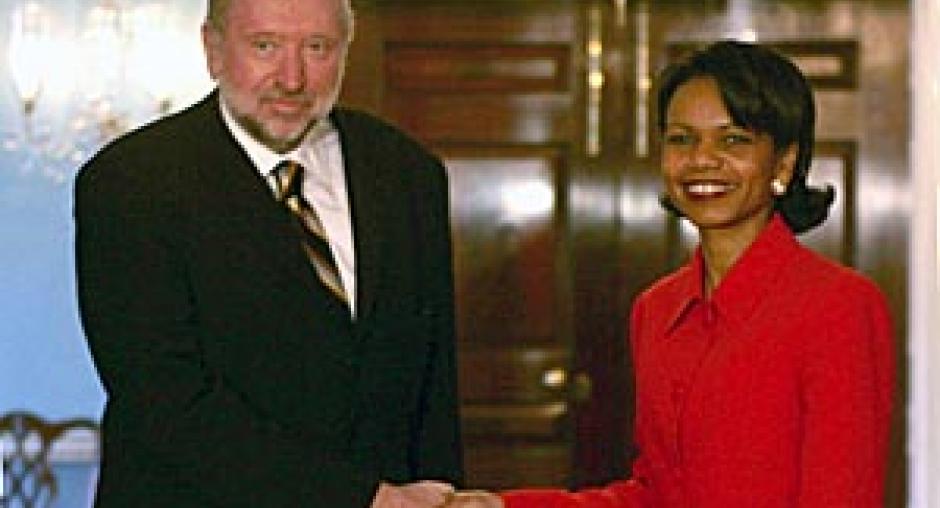Newsroom
OSCE Chairman more optimistic on budget problems after talks with US Secretary of State
WASHINGTON, D.C. 8 March 2005

(BOBO/Kristina Kosec)The OSCE Chairman-in-Office Dimitrij Rupel meets U.S. State Secretary Condoleezza Rice in Washington, 7 March 2005 (BOBO/Kristina Kosec) Photo details
WASHINGTON, 8 March 2005 - The OSCE Chairman-in-Office, Slovenian Foreign Minister Dimitrij Rupel, said he was more optimistic that a solution could be found to an impasse over the Organization's 2005 budget after meeting US Secretary of State Condoleezza Rice on Monday.
On the first day of a two-day visit to Washington, the Chairman-in-Office met senior State Department officials and addressed the United States Institute of Peace, the Center for Strategic and International Studies and the National Press Club.
The situation in Kosovo and current disagreements within the OSCE over the 2005 budget and participating States' future contributions were the main topics in Minister Rupel's meeting with the Secretary of State.
"As far as our internal difficulties are concerned, I am much more optimistic after talking to the Secretary. She pledged very strong support for the work of the OSCE and encouraged the Slovenian Chairmanship to continue with its efforts to reach a compromise," he said.
"I am hopeful that we will see some progress in the coming weeks. We will certainly work extremely hard to achieve a breakthrough."
"We agreed on the need to energise all three dimensions of the OSCE's activities - the political-military dimension, the economic and environmental dimension and the human dimension," the Chairman-in-Office added. "But of course the fundamental human rights commitments, on which the OSCE is founded, cannot be questioned."
Minister Rupel said it was essential that the OSCE's internal problems should not distract it from its work of building security in Europe.
On Kosovo, he stressed the need for Kosovo Serbs to play an active role in the political process and said it was vital that the rights of minorities were protected.
"The future of the whole of south-eastern Europe must be seen in a European context," he added.
The Chairman-in-Office held separate discussions with other officials, including Acting Assistant Secretary for European and Eurasian Affairs Robert Bradtke and the US Ambassador to the OSCE, Stephan M. Minikes, which focussed on efforts to resolve long-standing conflicts in the OSCE region, including Moldova/Transdniestria and Nagorno-Karabakh.
On the first day of a two-day visit to Washington, the Chairman-in-Office met senior State Department officials and addressed the United States Institute of Peace, the Center for Strategic and International Studies and the National Press Club.
The situation in Kosovo and current disagreements within the OSCE over the 2005 budget and participating States' future contributions were the main topics in Minister Rupel's meeting with the Secretary of State.
"As far as our internal difficulties are concerned, I am much more optimistic after talking to the Secretary. She pledged very strong support for the work of the OSCE and encouraged the Slovenian Chairmanship to continue with its efforts to reach a compromise," he said.
"I am hopeful that we will see some progress in the coming weeks. We will certainly work extremely hard to achieve a breakthrough."
"We agreed on the need to energise all three dimensions of the OSCE's activities - the political-military dimension, the economic and environmental dimension and the human dimension," the Chairman-in-Office added. "But of course the fundamental human rights commitments, on which the OSCE is founded, cannot be questioned."
Minister Rupel said it was essential that the OSCE's internal problems should not distract it from its work of building security in Europe.
On Kosovo, he stressed the need for Kosovo Serbs to play an active role in the political process and said it was vital that the rights of minorities were protected.
"The future of the whole of south-eastern Europe must be seen in a European context," he added.
The Chairman-in-Office held separate discussions with other officials, including Acting Assistant Secretary for European and Eurasian Affairs Robert Bradtke and the US Ambassador to the OSCE, Stephan M. Minikes, which focussed on efforts to resolve long-standing conflicts in the OSCE region, including Moldova/Transdniestria and Nagorno-Karabakh.
